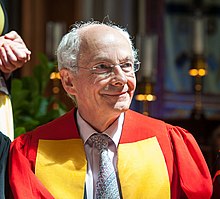Martin Hyland | |
|---|---|
 | |
| Born | John Martin Elliott Hyland |
| Alma mater | University of Oxford (DPhil) |
| Scientific career | |
| Fields |
Mathematics Theoretical computer science [1] |
| Institutions | University of Cambridge |
| Thesis | Recursion Theory on the Countable Functionals (1975) |
| Doctoral advisor | Robin Gandy [2] |
| Doctoral students | |
| Website |
www |
(John) Martin Elliott Hyland is professor of mathematical logic at the University of Cambridge and a fellow of King's College, Cambridge. His interests include mathematical logic, category theory, and theoretical computer science. [5]
Education
Hyland was educated at the University of Oxford where he was awarded a Doctor of Philosophy degree in 1975 [6] for research supervised by Robin Gandy. [2]
Research and career
Martin Hyland is best known for his work on category theory applied to logic ( proof theory, recursion theory), theoretical computer science ( lambda-calculus and semantics) and higher-dimensional algebra. [1] In particular he is known for work on the effective topos (within topos theory) and on game semantics. His former doctoral students include Eugenia Cheng [3] [7] and Valeria de Paiva. [2] [4]
References
- ^ a b Martin Hyland publications indexed by Google Scholar
- ^ a b c Martin Hyland at the Mathematics Genealogy Project
- ^ a b Cheng, Eugenia (2002). Higher-dimensional category theory : opetopic foundations (PDF). cheng.staff.shef.ac.uk (PhD thesis). University of Cambridge. OCLC 879393286. EThOS uk.bl.ethos.597569. Archived from the original (PDF) on 31 October 2008.
- ^ a b Paiva, Valeria Correa Vaz de (1988). The dialectica categories (PhD thesis). University of Cambridge. EThOS uk.bl.ethos.315050.
- ^ "Fellows of King's College". Cambridge University Reporter. 2 October 2008. Retrieved 15 July 2009.
- ^ Hyland, John Martin Elliot (1975). Recursion Theory on the Countable Functionals. bodleian.ox.ac.uk (PhD thesis). University of Oxford. OCLC 67751639. EThOS uk.bl.ethos.460247.
- ^ Cheng, Eugenia; Hyland, Martin; Power, John (2003). "Pseudo-distributive Laws". Electronic Notes in Theoretical Computer Science. 83: 227–245. doi: 10.1016/S1571-0661(03)50012-3. ISSN 1571-0661.